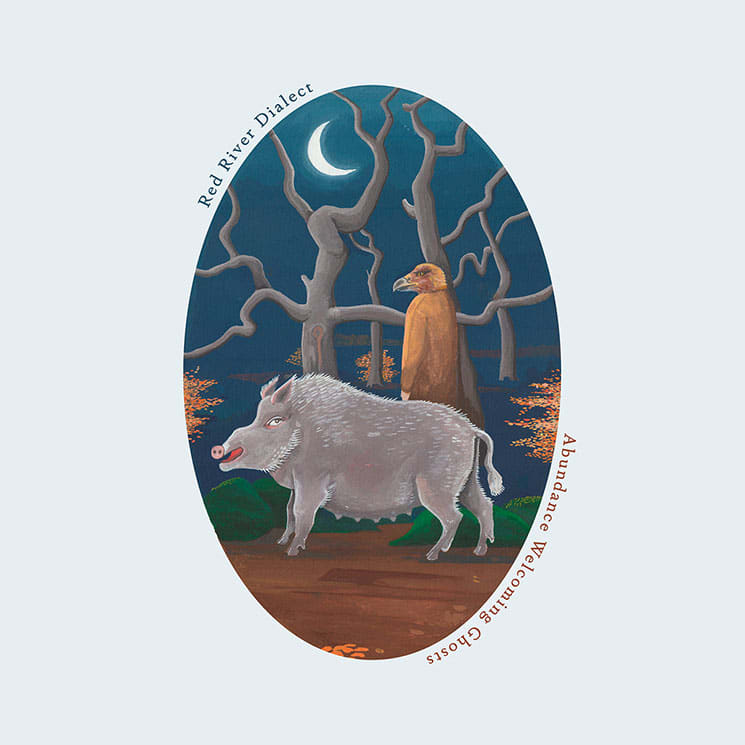Shortly after recording Red River Dialect's fifth album, Abundance Welcoming Ghosts, the band's singer and songwriter David Morris left Wales to move to a Buddhist monastery in Cape Breton, NS, where he lived for nine months. Although Morris hadn't envisioned this move when he wrote the songs, they do anticipate it; in rugged folk-rock, Abundance Welcoming Ghosts concerns itself with journeys, exploring the topography of self, the ridges and contours of the past and geography itself — sometimes all at once.
For Red River Dialect, these journeys aren't to be taken lightly; travelling with them feels weighty and serious. In nine songs — none shorter than four minutes — the band layer reaching jazz guitars and jumpy, unsentimental violins over meaty acoustics and restless pianos to create a weathered, rugged sound.
These elements sometimes meet in ecstatic, earthy outbursts, as they do on "Snowden," on which Morris sings, "This is the closest point in Wales to heaven / The closest point to heaven in Wales / The closest point to Wales in heaven / Oh, I will meet you again when the two are the same."
At other times, the swilling instrumentation is subdued, foregrounding the stories that Morris's gruff voice is tasked with rasping out; on "Red River" the twilight lead guitar and creaky violin create a misty tone, but the real star is the story, involving a woman's quest to translate her mother's words so she can get a tattoo of them, a historical account of this Métis dialect and Morris's own anxiety about using it as a band name. "Did I take a name / Did I take a name in veins?" he sings worriedly.
Abundance Welcoming Ghosts is a heady album rife with heartfelt journeys. It does require a measure of work, however: the album sometimes feels as though it isn't exploring different sounds so much as the same sounds in different states of flux, the unwaveringly serious tone is occasionally tiring, and lyrics describing voyages through forests, mountains and streams can overload the senses and seep into each other. Abundance Welcoming Ghosts is, in other words, not always an easy journey, but its desire to thoughtfully explore the nooks and crannies of the land and the heart do make it worth the effort.
(Paradise of Bachelors)For Red River Dialect, these journeys aren't to be taken lightly; travelling with them feels weighty and serious. In nine songs — none shorter than four minutes — the band layer reaching jazz guitars and jumpy, unsentimental violins over meaty acoustics and restless pianos to create a weathered, rugged sound.
These elements sometimes meet in ecstatic, earthy outbursts, as they do on "Snowden," on which Morris sings, "This is the closest point in Wales to heaven / The closest point to heaven in Wales / The closest point to Wales in heaven / Oh, I will meet you again when the two are the same."
At other times, the swilling instrumentation is subdued, foregrounding the stories that Morris's gruff voice is tasked with rasping out; on "Red River" the twilight lead guitar and creaky violin create a misty tone, but the real star is the story, involving a woman's quest to translate her mother's words so she can get a tattoo of them, a historical account of this Métis dialect and Morris's own anxiety about using it as a band name. "Did I take a name / Did I take a name in veins?" he sings worriedly.
Abundance Welcoming Ghosts is a heady album rife with heartfelt journeys. It does require a measure of work, however: the album sometimes feels as though it isn't exploring different sounds so much as the same sounds in different states of flux, the unwaveringly serious tone is occasionally tiring, and lyrics describing voyages through forests, mountains and streams can overload the senses and seep into each other. Abundance Welcoming Ghosts is, in other words, not always an easy journey, but its desire to thoughtfully explore the nooks and crannies of the land and the heart do make it worth the effort.
